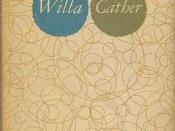Raymond Carver, poet, essayist, and short story writer, was very different from some other writers in that he clipped his writing until only the essential remained. ' Carver not only acknowledged the effect that fiction could have on readers, he proclaimed that it should affect readers.'( Bonetti 58) Thus, when Carver writes about intimate relationships, the reader perceives the stories as more than entertainment or skillful language; the reader relates to the characters' situations and applies the knowledge to their own lives. It is within this realm of character affirmation that Carver draws a much more elaborate, and meaningful detail in his short stories. I propose that Carver's characters either connect or fail to connect on an intimate, spiritual level. It is this difference in his short stories which either draw the reader into or away from the meaning. These relations make certain writings in Carver's stories more interesting.
More directly, it is the communion in his later writings, and the disjunction in his earlier writings, that distinguish the two types of styles. Communion within the characters of Carver's later writings, as in his collections in Cathedral, create much more depth and interest in his stories. It is within this scope of communion that Carver's stories seem to become more fulfilling with character affirmation.
Communion occurs in Carver's stories when several conditions are satisfied. The difference in the two criteria; communion and disjunction, is simply defined. 'Communion, n 1. A sharing of thoughts or feelings 2. a A religious or spiritual fellowship.' (Websters, 141) It is a connection between characters which allows them to transcend the ordinary and redefine themselves. A moment in which words, actions, and objects take on exaggerated significance . Carver uses this bond between characters in his later writings more directly, such as in his...


